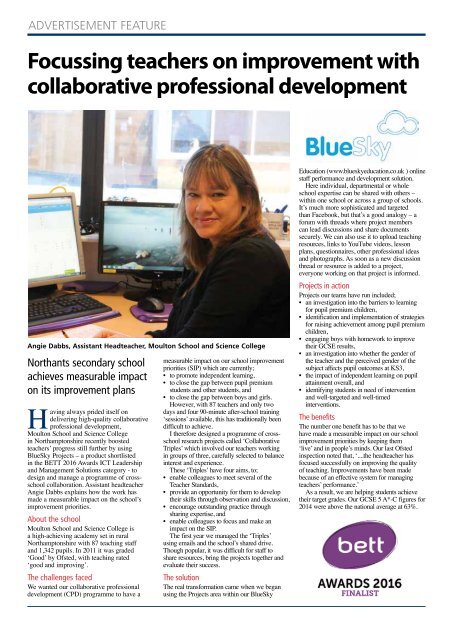Bett 2016
BettShow2016
BettShow2016
You also want an ePaper? Increase the reach of your titles
YUMPU automatically turns print PDFs into web optimized ePapers that Google loves.
Advertisement feature<br />
Focussing teachers on improvement with<br />
collaborative professional development<br />
Angie Dabbs, Assistant Headteacher, Moulton School and Science College<br />
Northants secondary school<br />
achieves measurable impact<br />
on its improvement plans<br />
Having always prided itself on<br />
delivering high-quality collaborative<br />
professional development,<br />
Moulton School and Science College<br />
in Northamptonshire recently boosted<br />
teachers’ progress still further by using<br />
BlueSky Projects – a product shortlisted<br />
in the BETT <strong>2016</strong> Awards ICT Leadership<br />
and Management Solutions category - to<br />
design and manage a programme of crossschool<br />
collaboration. Assistant headteacher<br />
Angie Dabbs explains how the work has<br />
made a measurable impact on the school’s<br />
improvement priorities.<br />
About the school<br />
Moulton School and Science College is<br />
a high-achieving academy set in rural<br />
Northamptonshire with 87 teaching staff<br />
and 1,342 pupils. In 2011 it was graded<br />
‘Good’ by Ofsted, with teaching rated<br />
‘good and improving’.<br />
The challenges faced<br />
We wanted our collaborative professional<br />
development (CPD) programme to have a<br />
measurable impact on our school improvement<br />
priorities (SIP) which are currently;<br />
• to promote independent learning,<br />
• to close the gap between pupil premium<br />
students and other students, and<br />
• to close the gap between boys and girls.<br />
However, with 87 teachers and only two<br />
days and four 90-minute after-school training<br />
‘sessions’ available, this has traditionally been<br />
difficult to achieve.<br />
I therefore designed a programme of crossschool<br />
research projects called ‘Collaborative<br />
Triples’ which involved our teachers working<br />
in groups of three, carefully selected to balance<br />
interest and experience.<br />
These ‘Triples’ have four aims, to;<br />
• enable colleagues to meet several of the<br />
Teacher Standards,<br />
• provide an opportunity for them to develop<br />
their skills through observation and discussion,<br />
• encourage outstanding practice through<br />
sharing expertise, and<br />
• enable colleagues to focus and make an<br />
impact on the SIP.<br />
The first year we managed the ‘Triples’<br />
using emails and the school’s shared drive.<br />
Though popular, it was difficult for staff to<br />
share resources, bring the projects together and<br />
evaluate their success.<br />
The solution<br />
The real transformation came when we began<br />
using the Projects area within our BlueSky<br />
Education (www.blueskyeducation.co.uk ) online<br />
staff performance and development solution.<br />
Here individual, departmental or whole<br />
school expertise can be shared with others –<br />
within one school or across a group of schools.<br />
It’s much more sophisticated and targeted<br />
than Facebook, but that’s a good analogy – a<br />
forum with threads where project members<br />
can lead discussions and share documents<br />
securely. We can also use it to upload teaching<br />
resources, links to YouTube videos, lesson<br />
plans, questionnaires, other professional ideas<br />
and photographs. As soon as a new discussion<br />
thread or resource is added to a project,<br />
everyone working on that project is informed.<br />
Projects in action<br />
Projects our teams have run included;<br />
• an investigation into the barriers to learning<br />
for pupil premium children,<br />
• identification and implementation of strategies<br />
for raising achievement among pupil premium<br />
children,<br />
• engaging boys with homework to improve<br />
their GCSE results,<br />
• an investigation into whether the gender of<br />
the teacher and the perceived gender of the<br />
subject affects pupil outcomes at KS3,<br />
• the impact of independent learning on pupil<br />
attainment overall, and<br />
• identifying students in need of intervention<br />
and well-targeted and well-timed<br />
interventions.<br />
The benefits<br />
The number one benefit has to be that we<br />
have made a measurable impact on our school<br />
improvement priorities by keeping them<br />
‘live’ and in people’s minds. Our last Ofsted<br />
inspection noted that, ‘....the headteacher has<br />
focused successfully on improving the quality<br />
of teaching. Improvements have been made<br />
because of an effective system for managing<br />
teachers’ performance.’<br />
As a result, we are helping students achieve<br />
their target grades. Our GCSE 5 A*-C figures for<br />
2014 were above the national average at 63%.


